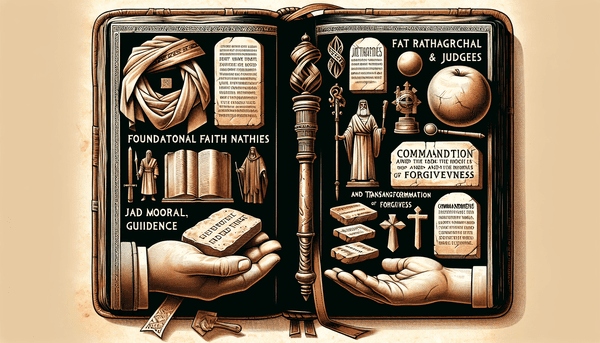The Patriarchs and Matriarchs: Foundations of Faith
At the heart of the biblical narrative is Abraham, often referred to as the 'Father of Faith.' It is in Genesis 12:1-3 that God calls Abraham to leave his country and promises to make him a great nation. Abraham's unwavering belief in God, despite the challenges he faced, was 'credited to him as righteousness' (Romans 4:3), serving as an everlasting testament to his faith. This legacy of faith continued through his grandson Jacob, who fathered twelve sons, each becoming the patriarch of the tribes of Israel. Genesis 49 recounts the blessings Jacob bestowed upon them, laying the groundwork for the nation of Israel. Among these sons, Joseph's journey from being sold into slavery to becoming a ruler in Egypt underscores a powerful theme of forgiveness and God's sovereignty, as he himself acknowledged that what his brothers meant for evil, God meant for good (Genesis 50:20).
The Judges: Deliverance and Righteousness
The book of Judges chronicles a period of Israelite history where God raised up leaders to deliver His people from oppression and guide them back to the path of obedience. These judges, such as Deborah, who is celebrated for her wisdom and leadership (Judges 4:4-5), and Gideon, whose faith and courage overcame immense odds (Judges 6:11-16), highlight the diverse ways God worked through individuals to accomplish His purposes. Samson, another judge, is remembered for his great strength and the Spirit of the Lord that stirred him (Judges 13:24-25), though his life was also marked by personal flaws. Samuel, the last of the judges, is venerated not only for his role as a judge but also as a prophet who faithfully served God all his days (1 Samuel 3:19-20). These stories of the judges are not mere historical accounts but are laden with lessons on leadership, faith, and the importance of following God's commands.
Forgiveness and Reconciliation: The Heart of Relationships
The Bible places a strong emphasis on forgiveness and reconciliation, teaching that we should forgive others just as God has forgiven us. In the Lord's Prayer, Jesus taught His disciples to ask for forgiveness and to extend it to others (Matthew 6:12). This theme is vividly portrayed in the story of Joseph, who, despite the pain caused by his brothers, chose to forgive and provide for them during famine (Genesis 45:5). The apostle Paul echoes this sentiment in Colossians 3:13, where he encourages believers to bear with each other and forgive grievances. Reconciliation is further underlined as essential in Christian relationships, as seen in 2 Corinthians 5:18-19, where Paul speaks of the ministry of reconciliation given to us by God. The essence of these teachings is that forgiveness is not just an act of mercy but a fundamental component of restored relationships.
Conclusion
As we conclude our exploration of these enduring biblical themes, we are reminded of the timeless relevance of the Bible's teachings. The patriarchs and judges, with their varied experiences of faith and leadership, set the stage for a life of obedience and service to God. The commandments given to Moses illuminate the path of righteousness that leads to a harmonious relationship with our Creator and fellow humans. Joseph's story of forgiveness and reconciliation offers an exemplary model of overcoming personal betrayal with grace and mercy. These narratives, intertwined with divine wisdom, encourage us to reflect on our own lives and to strive towards embodying the faith, love, and wisdom imparted by the scriptures. May these lessons from the past continue to guide us in our journey of faith.
FAQ
Q: Who is the father of faith in the Bible?
A: The father of faith in the Bible is Abraham. His unwavering trust and obedience to God serve as a powerful example for all believers.
Q: Can you list all the sons of Jacob?
A: Yes, Jacob had twelve sons: Reuben, Simeon, Levi, Judah, Dan, Naphtali, Gad, Asher, Issachar, Zebulun, Joseph, and Benjamin. These sons became the patriarchs of the twelve tribes of Israel.
Q: Who are all the judges mentioned in the Bible?
A: Some of the prominent judges include Othniel, Ehud, Deborah, Gideon, Jephthah, Samson, and Samuel. Each played a significant role in the history of Israel.
Q: Where's the scripture of Reuben secretly planning to save Joseph?
A: The account of Reuben's plan to rescue Joseph is found in Genesis 37:21-22. Reuben suggested throwing Joseph into a cistern, intending to rescue him later and return him to their father.






